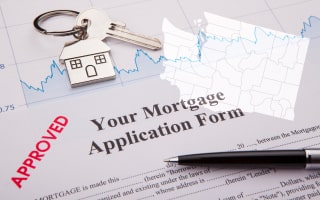Home Buying in Washington

From its bustling urban centers to its scenic landscapes and tranquil rural communities, Washington State offers captivating and diverse living options, making it an ideal place for many homebuyers. Whether you are drawn to the high-tech hub of Seattle or the quiet, picturesque towns nestled in the Cascade Mountains, The Evergreen State boasts a robust economy, a thriving job market, and an excellent quality of life. While the natural beauty and economic growth make Washington attractive, navigating its housing market can be challenging due to limited inventory and rising prices, particularly in urban centers.
The Washington housing market is dynamic, offering various properties across urban, suburban, and rural areas. While prices vary depending on the region and available amenities, Washington tends to have higher-than-average home prices, driven partly by strong demand, particularly in urban areas like Seattle. The median home price in Washington is approximately $600,000, which is higher than the national average and significantly higher than neighboring states like Idaho and Oregon.
In high-demand areas, homes typically sell within two weeks, reflecting a strong seller's market. Buyers often face competitive bidding situations, and homes can sell for well above the asking price. In more affordable regions like Spokane or Yakima, properties may stay on the market slightly longer but are still in demand. This has made buying a home in Washington especially difficult for lower-income and first-time home buyers.
Before entering Washington's housing market, buyers must be ready to research local trends, understand regional differences, and consider factors like school districts, commute times, and property taxes. Partnering with a knowledgeable local real estate agent is crucial for navigating this highly competitive market and finding the perfect home to fit your needs.
Current Washington Housing Trends
Understanding Washington's housing market dynamics is essential for making informed decisions as a buyer.
Here are some key statistics and trends to consider:
-
Median Home Price
The median home price in Washington is approximately $600,000, making it one of the more expensive housing markets in the United States. Prices can vary significantly depending on location, with cities like Seattle, Bellevue, and Redmond seeing median home prices soar to over $800,000. Rural areas in and around Spokane and Yakima offer more affordable options. Homes there typically have a median price of between $300,000 and $400,000. The state's strong job market, driven by tech giants like Amazon and Microsoft, has contributed to the state's higher housing demand, particularly in the Seattle metro area.
-
Number of Homes Sold
Washington's real estate market remains active, with more than 8,000 homes sold monthly statewide. While the Seattle metro area accounts for a significant portion of home sales, suburban regions like Tacoma, Everett, and Olympia have also seen steady demand, particularly as remote work trends continue to drive homebuyers away from the high-priced urban core. Eastern Washington, in and around Spokane and the Tri-Cities region, has also experienced growth, offering more affordable housing options to buyers.
-
Median Days on Market
The median Days on Market (DOM) for homes in Washington, which is the time it takes for a home to go to contract after it is listed, is around 21 days, though this figure varies by region. In the fast-paced Seattle and Bellevue markets, homes often sell in less than two weeks, while more rural areas may see homes on the market for 40 days or longer. Bidding wars are common in some of the state's most popular areas, with many homes selling above the asking price.
-
Housing Supply
Like many states, Washington faces a housing shortage, particularly in and around its urban centers. Seattle, for example, has struggled to keep up with demand, with new construction significantly lagging behind population growth. The state has just over a one-month supply of homes, far below the 5–6-month supply needed to balance the market.
While the state has worked diligently on a Housing Advisory Plan that aims to increase housing inventory through zoning reforms and incentives for new developments, it will take time for these efforts to have a noticeable impact on the market. The state is estimated to need at least 250,000 new housing units to meet current demands.
How to Find the Right Home to Buy in Washington

Navigating Washington's diverse and competitive housing market requires expert guidance. Therefore, working with a local real estate agent is crucial when buying a home in the state. A local agent will help you understand the nuances of the market, regional trends, and how they align with your needs and goals. If you're looking for a reputable agent, referrals from friends and family or checking online reviews can be a helpful way to make a well-informed decision.
Finding the Right Home
Finding the right home in Washington involves evaluating several key factors, such as the location, the type of home that suits your lifestyle, and ongoing costs like property taxes and maintenance fees. Considering these factors will put you on the right path to finding a home that meets your personal and financial needs.
Location
Washington offers a variety of living environments, each with unique advantages. Choosing the right location is key to finding your ideal home.
-
Urban vs. Suburban vs. Rural: Washington's major urban centers, including Seattle, Tacoma, and Bellevue, offer vibrant city living with access to cultural amenities, job opportunities, and a robust public transportation infrastructure. Suburban areas like Redmond, Kirkland, and Issaquah are known for their family-friendly neighborhoods, top-rated schools, and proximity to major employers. For those seeking tranquility and affordability, rural Washington, such as the Olympic Peninsula or Eastern Washington towns like Walla Walla and Wenatchee, offers scenic beauty, many outdoor recreational opportunities, and a more relaxed way of life.
-
Proximity to Work: Washington's job market is centered around the Seattle metro area, home to major employers like Microsoft, Amazon, and Boeing. Living in these cities or nearby suburbs offers shorter commutes for professionals. For those who can work remotely or don't mind a longer commute, more affordable housing options are available in rural areas further from the urban cores.
-
Public Transportation: Washington has a well-developed public transportation system in its urban regions. Sound Transit's light rail, buses, and ferries connect various neighborhoods in the Seattle area, making commuting convenient. Suburbs along transit lines have seen rising property values due to accessibility. However, in rural parts of the state, public transportation is limited, so access to major highways like I-5 and I-90 becomes essential for those who plan to commute.
-
Property Taxes: Washington's property tax rates vary by county, with an average of around 1.03%, slightly lower than the national average. However, property values in urban centers like Seattle and Bellevue are higher, leading to larger overall tax bills for homeowners. Rural areas offer lower property values and more affordable tax rates, making them attractive to budget-conscious buyers. Property taxes are an important consideration when calculating the overall cost of homeownership in Washington.
Types of Homes in Washington
Washington's housing market offers a variety of home types to suit different lifestyles and preferences.
Here are some of the most common types of homes you'll encounter when home-buying in Washington:
-
Single-Family Homes: Single-family homes are the most popular type of home in Washington, especially in suburban areas like Bellevue, Redmond, and Kent. These homes offer privacy and space, making them a great choice for families or anyone looking to settle down. However, they also come with responsibilities such as yard maintenance and higher utility costs.
-
Condominiums: Condos are common in urban areas like Seattle, where space is at a premium. They provide a low-maintenance lifestyle with shared amenities like gyms, pools, and security services. Condo fees can be substantial, so factoring these into your home-buying budget is important.
-
Townhomes: Townhomes offer a compromise between single-family homes and condos. They provide more space than a condo and less maintenance than a detached home. In Washington, townhomes are particularly popular in densely populated areas like Capitol Hill in Seattle and downtown Bellevue.
-
Luxury Homes: Washington has many high-end properties, particularly in Seattle, Bellevue, and Mercer Island. These luxury homes often feature waterfront views, state-of-the-art amenities, and high price tags.
The Home Buying Process in Washington
Here is a typical outline of the home-buying process in Washington:
- Get prequalified for a mortgage.
- Work with a local real estate agent.
- Make an offer on a home.
- Schedule a home inspection.
- Close on your new home.
Financing Your Washington Home Purchase

Washington homebuyers have a variety of financing options, ranging from traditional mortgages to government-backed loans. Understanding these options can help you find the best fit for your financial situation and long-term goals.
![]() Traditional Mortgages
Traditional Mortgages
Washington homebuyers can choose between fixed-rate and adjustable-rate mortgages (ARMs), each offering distinct benefits depending on your needs:
- Fixed-Rate Mortgages: A fixed-rate mortgage is a common choice for buyers who plan to stay in their homes for the long haul. They offer stability through consistent monthly payments and an interest rate that stays the same throughout the life of the loan. This predictability makes it easier to budget and protects homeowners from market fluctuations.
- Adjustable-Rate Mortgages (ARMs): ARMs typically start with lower initial rates, making them appealing to buyers looking for short-term savings. However, the interest rate adjusts periodically based on market conditions, which introduces risk if rates increase. ARMs are a good option for buyers who plan to sell or refinance before the rate adjusts or if they expect interest rates to decrease over time.
In Washington, major national banks like Wells Fargo and Bank of America and local lenders like BECU offer various mortgage options, including programs tailored for first-time buyers and flexible loan programs for varying financial needs.
![]() Government-Backed Loans
Government-Backed Loans
Washington offers several government-backed loan programs designed to assist homebuyers who qualify, including:
- Home Advantage Program: Through its Home Advantage Program, the Washington State Housing Finance Commission offers an array of home loan options to qualifying homebuyers across the state.
- FHA (Federal Housing Administration) Loans: FHA loans are popular with first-time homebuyers. They offer lower down payment requirements and more flexible credit criteria than traditional loans.
- VA (Veterans Affairs) Loans: Available to qualifying veterans, active-duty military members, and their families, VA loans provide competitive interest rates and require no down payment, making homeownership more accessible to those who have served.
- USDA (United States Department of Agriculture) Loans: USDA loans help homebuyers in rural areas of Washington by offering low-interest financing with no down payment required. These loans are available to buyers purchasing homes in qualifying rural areas, which include large parts of Eastern Washington.
![]() Down Payment Assistance Programs
Down Payment Assistance Programs
The Washington State Housing Finance Commission also provides down payment assistance programs to help make homeownership more attainable, particularly for first-time buyers. These programs are designed to help ease the burden of upfront costs by providing down payment and closing cost assistance to qualified buyers, making it easier for buyers to achieve homeownership in Washington's competitive market.
In addition to state-level programs, some local municipalities in Washington also offer down payment assistance. Check with local housing authorities for specific opportunities in your area.
Home Insurance in Washington

The average annual cost of home insurance in Washington is around $1,300, though rates can be higher in areas prone to natural disasters like earthquakes or wildfires. Homeowners in the Puget Sound region may also face higher premiums due to the risk of flooding. In some areas, these risks can push the premiums as high as $3,000.
Home Buying Challenges in Washington State
Washington homebuyers face several challenges when entering the housing market, especially for the first time. These challenges may include:
-
High Home Prices: The state's booming, tech-driven economy has pushed home prices to record levels, particularly in the Seattle area.
-
Limited Inventory: The shortage of available homes across the state has led to intense competition, with many buyers facing bidding wars.
-
Natural Disasters: Washington is susceptible to natural disasters such as earthquakes and wildfires, impacting insurance costs and availability.
Washington Home Inspections
Washington state has plenty of blizzards, floods, wildfires, and severe thunderstorms, so a home inspection before buying is crucial. The inspection identifies potential issues before they become costly. So many things can go wrong during a home purchase. At least with a home inspection, the buyer can feel confident they know everything they need to make an informed purchase.
A typical Washington home inspection covers the home's major systems and components, looking for anything damaged, non-functional, or needing replacing. That includes the following items:
-
Structural Elements: Foundation, walls, ceilings, stairs, and other structural elements.
-
Exterior: Roof, siding, windows, doors, decks, and porches.
-
Grounds: Walkways, grading, drainage, driveway, and other property areas.
-
Heating, Venting, and Air Conditioning: Heating and cooling systems, vents, flues, chimneys, and ductwork.
-
Plumbing: Pipes, fixtures (toilets, sinks, tubs, showers, faucets), and water heaters.
-
Electrical: Wiring, outlets, switches, circuit breakers, and electrical panels.
-
Appliances: Built-in and free-standing appliances that come with the house.
-
Attic and Basement: Insulation, ventilation, moisture, and mold.
-
Fire and Safety: Smoke alarms, carbon monoxide detectors, and sprinkler systems.
The inspector examines the entire house from top to bottom, looking for any areas of concern. Then, the inspector prepares a comprehensive report with photographs for the buyer to review. The inspector may also provide copies to other parties, like the mortgage lender.
A Washington home inspection costs between $400 and $600, depending on the property size, location, and complexity of the inspection. The average price of a Seattle home inspection is $400-$600.
The Process
Since the home inspection is part of the buyer's due diligence and benefits them, they are the ones to pay for a Washington home inspection. The process is as follows:
- Find a local home inspection company you want to work with.
- Schedule the home inspection as soon as possible.
- Attend the inspection and ask questions. They usually last between 2 and 3 hours.
- Review the inspection report and decide what, if anything, to do.
The top five home inspection companies in the state of Washington are:
- Top Notch Home Inspection - Centralia, WA
- WIN Home Inspection - North Seattle, WA
- Washington Premier Home Inspection LLC - Monroe, WA
- Key Inspection Services, LLC - Lynnwood, WA
- Mountains to Sound Home Inspection - Tacoma, WA
After the Inspection
After the inspector completes the physical inspection, they will prepare a report. That usually takes a few days. If the report includes any serious issues, the buyer has some options available to them. Those options are as follows:
- Try to save some money by negotiating a lower price if repairs are needed.
- They can ask the seller to make all the repairs before the sale is complete.
- If the issues are severe, the buyer can withdraw from the sale altogether.
- They can also request a home warranty or secure a lower down payment.
Inspection Top Cities
| City | Inspection Cost | Local Issues | Local Rules | Local Home Types |
|---|---|---|---|---|
| Home Inspection in Seattle | $400-$600 depending on the home's size and number of things inspected. | Structural, foundation, roof, plumbing, electrical, HVAC, water damage, and termites. | Not mandatory, but strongly recommended. | Craftsman Bungalows, Mid-Century Modern homes, Northwest Contemporary, Ranch-style homes, and Victorian homes. |
| Home Inspection in Spokane | $425-$600 based on the home's size, location, and complexity. | Roofing, electrical wiring, plumbing, HVAC, and foundation issues. | Optional, no city regulations. | Single-family homes, condos, townhomes, and apartments. |
| Home Inspection in Tacoma | $400-$600 based on the size and number of inspection systems. | Roof, electrical, plumbing, and water damage, particularly in basements and attics. | Not legally required, but strongly recommended. | Single-family, townhomes, condos, and tiny houses. |
| Home Inspection in Vancouver | $400-$700 depending on the size and location of the house. | Roofing, electrical wiring, poor ventilation, insulation, and plumbing problems. | Not legally required. | Single-family, townhomes, condos, and apartments. |
| Home Inspection in Bellevue | $425-$600 based on size and location. | Roof, electrical, plumbing, foundation and HVAC. | Not required for mortgage loans. | Single-family homes, townhomes, condos, and multi-family structures. |
Traversing Washington's Complex Housing Market
Buying a home in Washington presents many opportunities, from urban living in dynamic cities like Seattle and Bellevue to the tranquility of rural areas in Eastern Washington or the Olympic Peninsula. Washington's strong economy, diverse job market, and desirable quality of life make it a popular destination for homebuyers. However, the housing market is not without challenges, including rising home prices and limited inventory. Additionally, buyers in certain areas may face higher insurance costs due to risks from natural disasters like earthquakes or wildfires.
Preparation is crucial for prospective homebuyers in Washington. Understanding local housing trends, financing options, and regional factors will help you navigate the state's competitive market. It's essential to research the type of home you want and to factor commute times, school districts, and property taxes into your decision. Working with a knowledgeable local real estate agent is invaluable, as they can provide insights into specific neighborhoods and guide you through the complexities of buying a home in Washington.
Finding your dream home in The Evergreen State is an attainable goal with the right guidance, diligence, and a well-thought-out strategy. Whether you're drawn to the energy of its urban centers, the quiet of its suburban communities, or the natural beauty of its rural regions, the key to success lies in thorough planning and a clear understanding of Washington's complex real estate market.
Home Buying Guide
Instant Access to Washington Property Records
- Owner(s)
- Deed Records
- Loans & Liens
- Values
- Taxes
- Building Permits
- Purchase History
- Property Details
- And More!